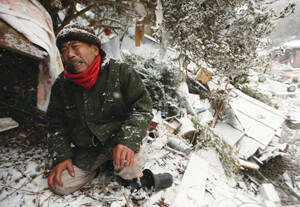Japanese church officials are setting up an emergency center to coordinate humanitarian aid operations in Sendai, the area most devastated by the March 11 earthquake and tsunami. The center will be managed by Caritas Japan and will draw on the resources of numerous Catholic volunteers who have come forward in the wake of the disaster. Japan’s bishops decided to establish the center and initiate other relief efforts under the supervision of Caritas at an emergency meeting in Sendai on March 16.
Describing the scene in Sendai after the earthquake and tsunami, the Rev. Daisuke Narui, executive director of Caritas Japan, said: “The panorama of destruction is striking.... Now we’ll have to roll up our shirtsleeves. People are expecting our help.”
“Today the dominant feeling is fear,” Father Narui said. “The biggest concern is the nuclear power plant in Fukushima. It is a ghost from Japanese history coming back to haunt us. But it must be said that the people are not indulging in panic; instead, they are reacting with poise and dignity.”
After the magnitude 9 earthquake, cooling procedures were fatally interrupted, and reactors at Fukushima were damaged by a number of explosions. Japanese nuclear engineers were working with increasing desperation to prevent a meltdown. Thousands have been evacuated from communities near the reactors. Father Narui said, “In the worst-affected areas, the main problem is the lack of food and fuel. As there is no fuel, people cannot move. And they are left feeling powerless in the face of this tragedy.”
Bishop Martin Tetsuo Hiraga of Sendai said that residents, cut off without electricity and with phone service only partially restored, were unaware of the worsening situation at the Fukushima plant. “You living in other countries have a much better idea of the tragedy,” the bishop added.
“We are terrified,” the bishop said. “We only have the government announcements; we have no other source of information. We don’t even know what has happened to our parishes in the towns and villages along the coast. We have no way of contacting them. I can only hope that the people of my diocese can stand together and be strong enough to overcome this disaster.” Japanese officials estimate about 10,000 people have perished.
Bishop Hiraga said: “We Catholics in the Diocese of Sendai are a few more than 10,000, a little flock. However, we continue to pray for the victims, and we will do everything possible to bring relief, to testify, at this time of suffering, to the message of Christ’s love.” Bishop Hiraga said the catastrophic events after the March 11 earthquake have left Japanese citizens “exhausted and disoriented.” He said that for this reason, “hope is exactly the gift Christians can make to the country at this time of suffering.”
As the magnitude of the disaster in Japan unfolded, international aid organizations stepped up efforts to respond. Bishop Isao Kikuchi of Niigata, president of Caritas Japan, said: “We have received so many e-mails from all continents, filled with words of compassion and prayer. We are very grateful for this solidarity. We believe that aid activity is needed, but prayer is also important in such a situation.”








